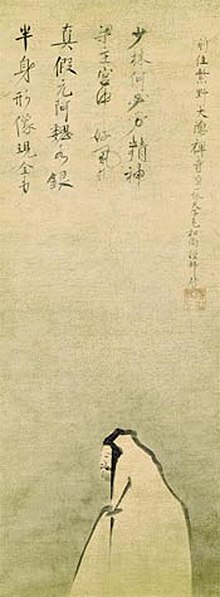Ikkyū
Japanese Buddhist monk
Ikkyu (一休宗純 Ikkyū Sōjun) (1394–1481) was an eccentric, iconoclastic Japanese Zen Buddhist priest, poet and calligrapher. He was born as an illegitimate son of Emperor Go-Komatsu and was forced to become a priest in his childhood. He has been thought as one of the influential figures in establishing the Japanese tea ceremony as a master of Murata Jukō , and esteemed as such, but their historical interaction is now in question.

The universe has dark and light, entrust oneself to change.


But it is also the birthplace of all the Buddhas of the ten thousand worlds.
Quotes
edit- South of Mount Sumeru
Who understands my Zen?
Call Master Kido over-
He's not worth a cent.- Lucien Stryk. Encounter with Zen: writings on poetry and Zen, 1981. p. 66.
- Natural, reckless, correct skill;
Yesterday's clarity is today's stupidity
The universe has dark and light, entrust oneself to change
One time, shade the eyes and gaze afar at the road of heaven.- As quoted in Ikkyū and The Crazy Cloud Anthology : A Zen Poet of Medieval Japan (1986) by Sonja Arntzen.
- Studying texts and stiff meditation can make you lose your Original Mind.
A solitary tune by a fisherman, though, can be an invaluable treasure.
Dusk rain on the river, the moon peeking in and out of the clouds;
Elegant beyond words, he chants his songs night after night.- "A Fisherman" in Wild Ways : Zen Poems (2003), edited and translated by John Stevens, p. 37.
- From the world of passions returning to the world of passions:
There is a moment's pause.
If it rains, let it rain, if the wind blows, let it blow.- As quoted in The Essence of Zen : Zen Buddhism for Every Day and Every Moment (2002) by Mark Levon Byrne, p. 28.
- It has the original mouth but remains wordless;
It is surrounded by a magnificent mound of hair.
Sentient beings can get completely lost in it
But it is also the birthplace of all the Buddhas of the ten thousand worlds.- "A Woman's Sex" in Wild Ways : Zen Poems (2003), edited and translated by John Stevens, p. 74.
- Eight inches strong, it is my favourite thing;
If I'm alone at night, I embrace it fully -
A beautiful woman hasn't touched it for ages.
Within my fundoshi there is an entire universe!- "A Man's Root" as quoted in Mishima's Sword : Travels in Search of a Samurai Legend (2007) by Christopher Ross, p. 195.
- In all the kingdom southward
From the center of the earth
Where is he who understands my Zen?
Should the master Kido himself appear
He wouldn't be worth a worn-out cent.- Japanese Death Poems. Compiled by Yoel Hoffmann. ISBN 978-0-8048-3179-6
Disputed
edit- Having no destination, I am never lost.
- Attributed to Ikkyu in Nine-headed Dragon River : Zen journals, 1969-1985 (1986) by Peter Matthiessen
Quotes about Ikkyu
edit- Ikkyū Zenji is the most remarkable monk in the history of Japanese Buddhism, the only Japanese comparable to the great Chinese Zen masters.
- Reginald Horace Blyth, Zen and Zen Classics : Twenty-five Zen Essays (1970).
- His "mad" behavior was perhaps his way of disrupting the corrupt and feeble Zen he saw around him.
- Peter Matthiessen, Nine-headed Dragon River : Zen journals, 1969-1985 (1986).